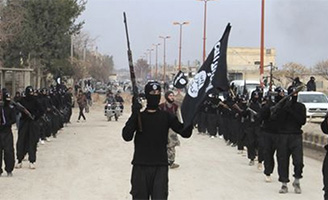The Prospects of IS in Afghanistan
By Sudha Ramachandran (04/01/2015 issue of the CACI Analyst)
The reported eastward expansion of the Islamic State (IS) into South Asia has set alarm bells ringing as it is expected to inflame the already volatile situation in Afghanistan and Pakistan. There are serious differences between the IS and the Taliban and the latter will put up a strong challenge to the growth of IS in Afghanistan. A sharp increase in violence in the strife-torn country can be expected as the Taliban and the IS battle for Afghan hearts, minds and territory. Importantly, the entry of IS into Afghanistan will impact the peace process.

Azerbaijanis in Syria
By Mina Muradova (11/26/2014 issue of the CACI Analyst)
Azerbaijani media have reported that a national wrestling champion was killed while fighting for the Islamic State (IS) militant group. News about Azerbaijani citizens – mostly young men – traveling to Syria to join militant groups are increasing. Observers believe that this trend underscores an emerging security threat to the secular Azerbaijan.
The wrestler, Rashad Bakhshaliyev, from the Ismailli district in northern Azerbaijan, appeared to lead a successful life before his sudden departure for Syria in August, taking his wife and child with him. He won various wresting competitions in Azerbaijan and before leaving for Syria worked as a freestyle wrestling coach in Ismailli’s Olympic complex. In September, he called his mother, Mirvari Bakhshaliyeva, from Syria and told her that everything was fine, but one month later his wife announced his death in a telephone call from Syria.
Of Azerbaijan’s population of over nine million, 93 percent identify as Muslims, the overwhelmingly majority of which is Shia (65-75 percent) while the remainder identify as Sunnis. No precise data exists for the number of Azerbaijanis who have been fighting in Syria. Local media claims the number of militants in Syria is between 200 and 400, with more than 100 killed in action.
In light of more frequent press coverage of Azerbaijani citizens allegedly participating in the Syrian conflict, security forces are now paying closer attention to this trend. On September 23, Azerbaijan’s security forces arrested 26 residents for allegedly joining armed Islamic groups in Pakistan, Iraq and Syria and some were alleged members of Azeri Jamaaty, a jihad group in Syria made up of Azerbaijani nationals. In May, the leader of an Azerbaijani IS faction in Raqqa, Mohammad al-Azeri, gave a video address in which he stated that IS was on the “correct path of jihad” in Syria.
Azerbaijanis fighting in Syria primarily come from Baku, Sumqayit, and smaller towns in northern Azerbaijan. Specifically Sumqayit, just 35 kilometers north of Baku, is considered as the main source of fighters, following Salafism and advocating a return to Islam in its purest form. Salafism was catalyzed in Azerbaijan by missionaries from the North Caucasus in the 1990s, funded by Kuwait and Saudi Arabia and mostly supported by Sunni Muslims.
Azerbaijan is considered attractive for recruiting due to the ease of travelling there by bus through Georgia and Turkey, and Azerbaijanis do not need visas to enter these countries. Some experts believe that the government’s repressive attitude to religious communities, including the adoption of a law limiting religious freedoms and justifying police detentions and high fines may lead to an increase in religious extremism in Azerbaijan.
Another threat is expected from neighboring Russia. Azerbaijanis constitute the second largest nationality in Moscow, at 14 percent of the city’s population of about 11 million. Economic decline due to Western sanctions is causing a reduction of migrants’ income and makes some more receptive to radical religious movements.
On November 2, IS released a video titled “A Message from Brother Abu Muhammad Ar-Rusi” via social media and jihadi forums. The appearance of an ethnic Russian in an IS propaganda and recruitment video is aimed at Russian-speaking Muslims. Moscow has expressed concern that Russian-speaking militants in Syria could return to the Russian Federation and commit terror attacks. With regard to the threat posed by IS, Russia has focused attention on militants from the North Caucasus and on labor migrants from former Soviet republics. Last week, Russian authorities carried out a wave of arrests in Moscow of Azerbaijani men with alleged links to IS.
The UN Security Council has adopted two resolutions this year, intended to coordinate international efforts to fight terrorism. The August resolution imposed sanctions on persons with alleged links to IS and the al-Qaeda-linked group Al-Nusra Front. The second resolution ratified in September required UN member states to deny entry to anyone suspected of supporting or engaging in terrorist-related activities, making it a criminal offence to travel abroad to train for or fight for jihadist groups. A few days ago, Azerbaijan’s government made corresponding amendments in its national legislation.
The EU counter-terrorism coordinator Gilles de Kerchove considered that between 20 and 30 percent of the over 3,000 Europeans who joined jihadist groups have now returned to their home countries. Some have resumed a normal life while some have become radicalized and dangerous, he warned. “The challenge is for each member state to assess each and every returnee, assess their dangerousness and provide the adequate response,” de Kerchove said.
Between Prosperity and the Taliban: Will IS Tip the Balance in Turkmenistan?
By Micha’el Tanchum (10/29/2014 issue of the CACI Analyst)
While energy-rich Turkmenistan is poised to become the next economic tiger of Central Asia, it has come under a growing threat from the Taliban since NATO’s troop drawdown in neighboring Afghanistan. Forces from the Taliban and various multi-ethnic, Central Asian jihadist militias associated with the Islamic Movement of Uzbekistan (IMU) have been concentrating in northern Afghanistan near the Turkmenistan border, producing unprecedented border clashes with Turkmenistan’s military during 2014. IMU leader Usman Ghazi’s recent declaration of allegiance to the Islamic State raises the concern that the Islamic State might assist the opening of a new jihadist front.





